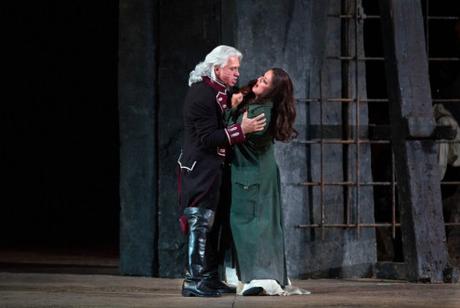 Count di Luna (Dmitri Hvorostovsky) & Leonora (Anna Netrebko) wrestle with Verdi’s Il Trovatore (Photo: Marty Sohl/Met Opera)
Count di Luna (Dmitri Hvorostovsky) & Leonora (Anna Netrebko) wrestle with Verdi’s Il Trovatore (Photo: Marty Sohl/Met Opera)Highs Cs and Low Bs
Lampooned and lambasted by everyone from Gilbert and Sullivan (The Pirates of Penzance) to the Marx Brothers (A Night at the Opera), as well as the British rock group Queen (“Bohemian Rhapsody”), Verdi’s Il Trovatore, a work full of fire and brimstone — not to mention copious quantities of blood — is that rarest of birds: a true, red-hot poker of a piece that provokes rivalries and violent outbursts in its protagonists and in the listener.
With its soaring melodies, fiery utterances, and eye-for-an-eye aesthetic, there are few lulls in this opera’s musical moments. Dramatically, most of the battles take place off-stage, although some directors try to get away with showing some of the fancy footwork we’ve been missing, in the grand manner of an Errol Flynn or Douglas Fairbanks Sr. swashbuckler.
To some extent, this was the case with the Metropolitan Opera’s February 13th broadcast. It was preceded by the PBS-TV network airing of the September 25, 2015 opening night performance of Il Trovatore, starring the redoubtable diva Anna Netrebko as Leonora, and the silver-haired hunk Dmitri Hvorostovsky as the Count di Luna. The other cast members included bass Štefan Kocán as the family retainer Ferrando, mezzo Dolora Zajick as the crazed gypsy woman Azucena, and Yonghoon Lee as the titular troubadour Manrico.
For the Met’s radio broadcast, however, we had Kwangchul Youn doing service as Ferrando, Angela Meade as the lovely Leonora, Spanish baritone Juan Jesus Rodriguez making his on-air debut as the lovesick Count, and Marcello Giordani as main man Manrico. Holding it all together in the pit for both performances was maestro Marco Armiliato.
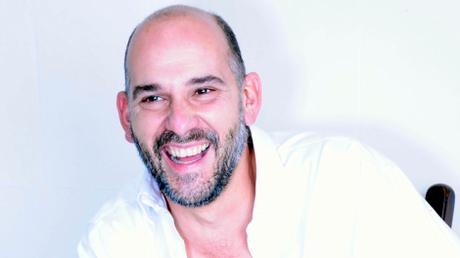
Reporting on the TV transmission, I can say that director David McVicar’s staging and designer Charles Edwards’ revolving set hold up well when seen in this format. It makes for quick scene changes and fills in the gaps in the story better than most such productions. No matter what approach is taken, one can never get completely away from plain old stand-up-and-sing. Although the houselights were raised a might for TV viewing, all in all this was an exciting program.
What made it work was the absolutely stunning performance by the two Russian leads, the winning team of Ms. Anna Netrebko and Mr. Dmitri Hvorostovsky. They played off one another beautifully: she, with an overwhelming sense of tragedy and that emotionally gripping quality; he, with a snarl on his lips and that dark burnish to his tone.
The all-out fervor Netrebko displayed in her two arias and cabalettas (the fourth-act one, the rarely heard “Tu vedrai,” was pure magic) was old-fashioned grandstanding at its finest — and the audience loved every minute of it! Her voice was overpowering dramatically, if a tad fuzzy as to the actual words. Coming off the previous season’s Lady Macbeth cycle, I can see why Ms. Netrebko has decided to drop some of her previous soubrette roles in favor of ones where boldness and the big gesture are called for. We hear that Wagner is on her horizon! Stay tuned for further bulletins …
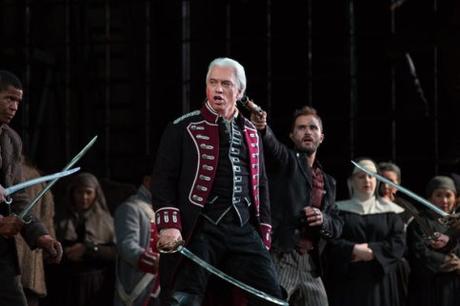
The other winner was Hvorostovsky. This was his first appearance after undergoing months of treatment for a brain tumor. His entrance in scene ii of Act I stopped the show. You could tell that Dmitri was moved by the huge outpouring of love for this marvelous artist. It took all his powers of concentration to go on with the show, which he did in spectacular form. It is no exaggeration to state that this was his most exuberant, most dynamically involved performance to date of the tempestuous Count di Luna.
Musically, Dmitri’s singing was beyond cavil. Talk about a golden age! That long Verdian line, for which he is rightly celebrated, was never better in the aria “Il balen del suo sorriso.” The role was firmly in his voice, and under his control, at all times. The top notes were all there, along with that characteristic melting quality. And, to top it all off, Dmitri looked simply smashing in his outfits, his smoldering carriage and noble bearing at one with the character. He was pelted with roses from every corner of the house at his curtain call.
Both Kocán and Youn, along with Ms. Zajick, are veterans of this production, and their respective parts. Kocán did what he could do with the lowly secondary role of Ferrando. He basically has that one scena at the start, “Abbietta zingara” (where a bit more bel canto agility is called for), and then disappears for a couple of scenes; only to return in Act III for some extra lines of dialog and a concerted ensemble. On the radio, Youn brought a mellow tone and firm presence to the role.
The voluminous Dolora Zajick has put more vigor into Azucena’s hallucinatory ravings in past performances, but histrionically she played it to the hilt when and where the score demanded (as in “Condotta all’era in ceppi,” her hair-raising account of throwing her baby onto her mother’s funeral pyre). She was a loving mother and a fierce avenger of the wrongs done to her in the past. What a back story this character has!
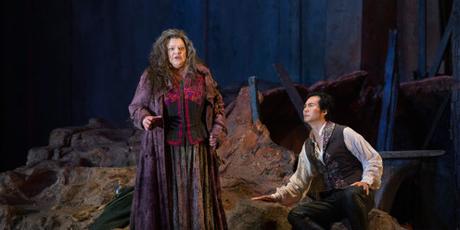
The misguided object of her affection, and of her revenge, is Manrico, her “adopted” (or perhaps one should say “co-opted”) offspring. Sung by Yonghoon Lee, the Korean tenor has given better all-around performances of spinto roles in both the French and Italian repertoires. His Don José in Bizet’s Carmen, for instance, was straight out of the Richard Tucker/Franco Corelli belt-it-to-the-rafters school (and that’s a good thing!).
In Trovatore, however, I felt he had reached his limit as far as volume and vocalism were concerned. Although Lee achieved varying shades of tenderness and finesse in “Ah, si ben mio,” his bombastic “Di quella pira” and forced high C, which sounded pushed beyond all comfort and ability, failed to catch fire with this listener. Maybe he was having an off night, or possibly opening night nerves. This was a Live in HD transmission, by the way, so that could have been a factor. Still, he was no match for the others.
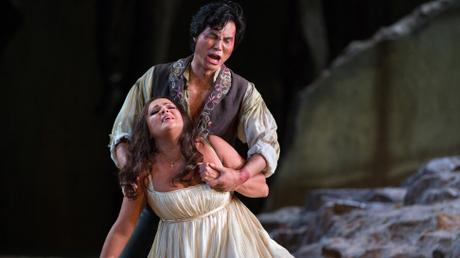
Conductor Armiliato did his utmost to mold these disparate forces into a cohesive whole. He continued to do so with the Saturday afternoon broadcast of February 13. Originally scheduled with Mr. Hvorostovsky as Di Luna, the Met substituted a debut artist, Spanish baritone Juan Jesús Rodriguez, in place of the indisposed Russian artist. Rodriguez delivered the goods in a virile manner, but the growling aspect that Dmitri is able to convey over the air was sorely missed. Not that Rodriguez sang badly — quite the contrary! This was a thoroughly competent reading that managed to salvage the radio performance, while doing no damage to the up-and-coming singer’s reputation.
Turning to Leonora, soprano Angela Meade has developed into an exceptional bel canto specialist. Like her colleague Netrebko, Meade’s voice has grown by leaps and bounds, spinning out phrases and trills with equal facility. At home in early and middle period Verdi, Meade caressed the vocal line in long, loving arcs, earning much-appreciated applause for the breathtaking beauty of her tone throughout. Her Act IV scene, “D’amor sull’ali rosee,” where she asks that her lover’s pain in prison be relieved by her love, was a tour de force, followed by an impassioned statement in the cabaletta. Marvelous!
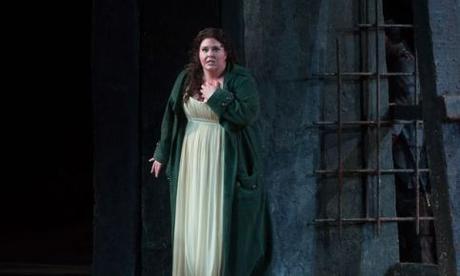
As for Signor Giordani, he behaved himself for the most part. He surprised me — pleasantly, I might add — with the warmth of his solos. Not only that, his past experience in the part, as well as his previous assignment as Verdi’s Ernani (a similar type of dashing, romantic lead), brought out hitherto untapped nuances where they were least expected. For example, “Ah, si ben mio” was delicate and sweet, with excellent enunciation and filled with conviction. The subsequent “Di quella pira” was stirring and vibrant. I had a tough time distinguishing whether the cabaletta was transposed down a semitone for the final high B, or performed as written, but ending on high C. Maybe my hearing was off that day as well.
Whatever note was sung, I do love this opera! It’s what Italian opera is all about: rivalry between opposing forces, love for the same woman, love for another man, love of mother for her son, love of son for his mother, lust for vengeance, lust for power, lust for possession of that which one cannot possess. Oh, yeah! All’s fair, or unfair, in love and war. It may give the art form a bad name, or make opera look silly to non-fans, but it can also make audiences rise to their feet and shout “bravo” with the best of them.
And there’s no finer composer for this kind of extroverted, do-or-die drama than Verdi. Say what you will about his gloomy temperament, he was the grandmaster of operatic passions. His times were mighty turbulent, too; much more so than many readers have been led to believe, if you consider the facts found in the definitive book in its field: Mary-Jane Phillips-Matz’s remarkably lucid and incredibly well-documented biography of his personal, business, and familial relationships. The great man was driven by passion and excellence, and it showed in this, his most exemplary outing.
As far as we’re concerned, Verdi had no rivals. And to bring this work to life requires singers of equal passion and excellence. Fortunately, there are enough of them around to do Trovatore justice. “Viva Verdi!” as they used to (and still) say.
Copyright © 2016 by Josmar F. Lopes

